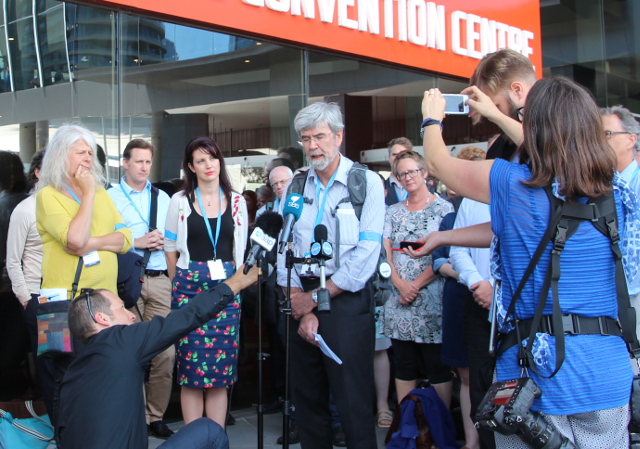
This is a guest post from the Conversation by John Church, CSIRO on the savage cuts to climate science and public good research by the management team at Australia's premier research institution: the Commonwealth Industrial Research Organisation (CSIRO). See my previous article from February: Climate science CSIRO job cuts labelled as science vandalism.
Parts of CSIRO’s climate science capability axed from the organisation could be absorbed by the Australian Bureau of Meteorology, according to media reports this week.
Under cuts announced in early February by chief executive Larry Marshall and Oceans and Atmosphere Director Ken Lee, CSIRO could lose 100 staff from the Oceans and Atmosphere business unit, mostly in the climate area, as part of a total of 350 job losses across the organisation. The cuts represent a reduction in CSIRO’s role in doing science for the public good. Marshall stated that the research focus would shift towards mitigating and adapting to climate change.
A potential partial solution could see the Bureau take on some aspects of the science programs lost from CSIRO, potentially involving a transfer of 40 to 50 climate staff. Australia’s Chief Scientist Alan Finkel has said he is “deeply concerned” about the time taken to develop a transition plan.
At this stage, it is unknown what will happen with the Bureau proposal. Picking up 40 to 50 staff would be a welcome step forward from the initial CSIRO cuts, but would be far from an optimal solution. There also needs to be a solution for the potential remaining loss of capability that would not be picked up by the Bureau.
The science isn’t done
The world, including Australia, has agreed that climate change is an important and pressing issue, that every nation has to contribute to cutting greenhouse gas emissions, and that we will all have to adapt to a changing climate.
Successful and cost-effective mitigation and adaptation requires ongoing (and indeed strengthened) climate science. This is specifically recognised in the Paris climate agreement.
Climate scientists don’t just do science for its own sake. Climate science is critical to mitigating climate change, and adapting to it. I have previously written on the many questions scientists still need to answer to deal with climate change.
Transferring research capacity
Climate change, as a major research issue facing Australia, has been central to CSIRO delivering under the Science and Industry Research Act 1949 (the CSIRO Act), and is also a key issue recognised in the CSIRO Strategy. Taxpayer support for CSIRO comes from its ability to independently address major issues facing the Australian community, including undertaking public good research such as studying climate change.
There have been numerous calls, including from Finkel and the Australian Academy of Science, to maintain Australia’s capability in climate science for the sake of the nation’s welfare.
If the significant cuts to climate science proceed as originally indicated, this would be effectively throwing hundreds of millions of dollars of investment onto the scientific scrap heap – an act of wanton vandalism.
If CSIRO wishes to vacate these areas, Australia’s climate science needs could be accomplished by the appropriate transfer of capability and capacity to some alternative structural arrangements. But this would need to be done with care and considerable consultation with partner organisations and the broader science community. It is clear that the necessary consultations to facilitate this did not happen before February’s announcement.
Such discussions have now begun, but the proposed transfers would at best save only a fraction of the existing and required capability.
While making alternative arrangements for climate science is a challenging problem, it is not acceptable for CSIRO to wash its hands of the issue and effectively say this is too hard – such an approach would be a major failure on the part of CSIRO’s executive and its board. Simply put, we need a satisfactory solution to cover the activities from which CSIRO is planning to withdraw.
I welcome a stronger focus on climate mitigation and sincerely hope that CSIRO increases investment in this area. I also welcome an increased focus on adaptation to that part of climate change we will not be able to avoid.
Both of these require continued climate science research but CSIRO is effectively cutting climate adaptation research through cuts to climate science.
Marshall comes to CSIRO with a reputation as an entrepreneur. Climate mitigation and adaptation are extremely high-profile issues and would seem excellent opportunities to put these skills into practice.
Narrow interpretation of innovation
CSIRO is a research organisation with broad responsibilities to the Australian community. The CSIRO Strategy as written, and the concept of innovation more generally, cover a broad remit that would be consistent with all of CSIRO’s responsibilities under their Act.
However, it appears (as documents released as part of the senate enquiry reveal) that the CSIRO Strategy and the word innovation are being interpreted in a very narrow and limited way as merely meaning support for industry.
Supporting industry is welcomed, but CSIRO cannot unilaterally change the scope of its remit – only the Commonwealth government can do that. CSIRO needs to continue to address the broader scope of issues of national interest.
A research organisation requires excellent two-way communication, both within the organisation and with stakeholders, and cannot effectively operate with a culture of extreme secretiveness and of command and control from the top.
It is clear that the required communication has not happened, with misleading and incomplete statements rather than openness characterising communication about the current changes.
This article is a revised version of an open letter by the author to chief executive Larry Marshall.
John Church, CSIRO Fellow, CSIRO
This article was originally published on The Conversation. Read the original article.
Photo: the lead image is of John Church addressing the media on the cuts at Melbourne Convention Centre on February 8, 2016 was taken by myself.

No comments:
Post a Comment